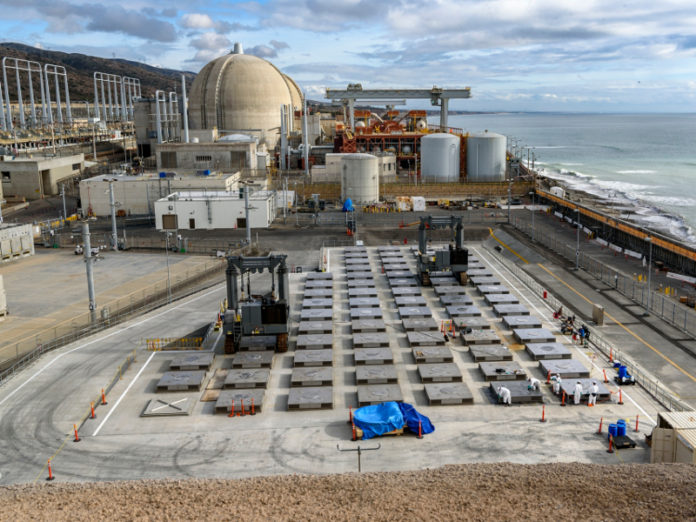Washington, D.C. – Today, U.S. Representatives Mike Levin (D-CA) and Darrell Issa (R-CA) reintroduced the Spent Fuel Prioritization Act to prioritize the removal of spent nuclear fuel (SNF) from decommissioned nuclear sites in areas with large populations, high seismic hazard, and where the continued storage of spent nuclear fuel represents a national security concern. With over nine million people living within 50 miles of the San Onofre Nuclear Generating Station (SONGS) and Southern California experiencing some of the greatest seismic hazard in the country, as well as its location on Marine Corps Base Camp Pendleton, the bill would make SONGS one of the highest priority sites in the nation for spent nuclear fuel removal. The bill is also cosponsored by Reps. Scott Peters (D-CA), Michelle Steel (R-CA), Katie Porter (D-CA), and Young Kim (R-CA).
“Since I was first sworn into Congress, one of my top priorities has been to advance efforts to remove the spent nuclear fuel from San Onofre,” said Rep. Levin. “Given its location on Marine Corps Base Camp Pendleton, in the vicinity of millions of people, atop earthquake fault lines running through the region, and adjacent to rising sea levels, San Onofre should be our top priority site when removing spent fuel from decommissioned sites. Over the past few years, we have made incredible progress to restart and advance the consent-based siting process at the Department of Energy. Now it’s time to pass this bipartisan legislation and make the commonsense decision to prioritize particularly sensitive sites like San Onofre for the removal of spent nuclear fuel.”
“Federal action on spent fuel storage at the now-closed San Onofre Nuclear Generating Station is long overdue, and disposal of power plant waste continues to be needlessly delayed by a process that lacks a commitment to a workable solution,” said Rep. Issa. “That’s why our bipartisan legislation should serve as a model in Congress and demonstrate that consensus is possible.”
“We need long-term solutions to nuclear waste storage, especially in San Diego, where nuclear-spent fuel is stored just yards away from the ocean,” said Rep. Peters. “For too long, Congress has stalled on ensuring our nuclear storage is secure. This bill will move us in the right direction and help prioritize removal from San Onofre.”
“As a founding member of the Spent Nuclear Fuel Solutions Caucus, I am proud to join my colleagues to introduce bipartisan solutions to the serious threat of spent nuclear fuels to over 9 million people living in proximity of the San Onofre Nuclear Generating Station in an earthquake zone,” said Rep. Steel. “This legislation will protect not only Southern California, but any areas across the country that are high risk.”
“Southern California faces a heightened risk of natural disasters, which threatens the safety of over nine million people who live in close proximity to the decommissioned San Onofre nuclear site,” said Rep. Porter. “We know that hazardous waste is a byproduct of nuclear energy; our government cannot shirk its duty to dispose of it in a responsible way—including keeping it away from seismic risks and population centers, like San Onofre. I look forward to continuing to work with colleagues in the Spent Nuclear Fuel Solutions Caucus to keep Americans safe.”
“We must avoid the potential of catastrophe for large population centers and military facilities when coordinating the removal and storage of spent nuclear fuel. In the event of an earthquake, this is especially important for Southern Californians as the San Onofre Nuclear Generating Station poses harmful risks to the millions of citizens living in Orange County, surrounding areas, and Camp Pendleton’s facilities,” said Rep. Young Kim. “The Spent Fuel Prioritization Act is critical to protect our communities from hazardous waste and support long term solutions for the safe storage of spent nuclear fuel. I’m proud to join in this bipartisan effort.”
“This legislation is vital to protecting San Diego County’s residents and environment. Allowing spent nuclear fuel to stay 100 feet from the Pacific Ocean, near a military base, and highly populated communities is unacceptable. The County of San Diego is strongly in favor of this legislation,” said Vice Chair of the San Diego County Board of Supervisors Terra Lawson-Remer.
The Spent Fuel Prioritization Act would require the Department of Energy (DOE) to prioritize the removal of SNF from decommissioned nuclear power plants based on the size of the population near the plant, seismic hazard associated with the area, and any national security concerns. The bill does not favor a permanent repository or consolidated interim storage, and does not authorize the transfer of spent fuel to any non-consenting state or locality.
Representative Levin has been a longtime advocate for increased transparency, accountability, and oversight at SONGS and for solutions to move the hazardous waste at San Onofre out of the region. In March 2020, Rep. Levin called on the House Appropriations Committee to fund a consolidated interim storage program at the DOE. Further, the letter stated that DOE’s program should initially focus on accepting fuel from closed nuclear plants while accounting for site-specific environmental factors. Both of these criteria favor removing fuel from the San Onofre Nuclear Generating Station and align with Rep. Levin’s Spent Fuel Prioritization Act. In December 2020, Rep. Levin voted for bipartisan government funding legislation that included the $20 million for the interim storage of spent nuclear fuel, as was requested in Rep. Levin’s letter. That legislation was subsequently signed into law, and funding under the law enabled the DOE to restart the consent-based siting process in November of 2021. He helped secure an additional $20 million in Fiscal Year 2022 for the DOE to continue work on consent-based siting, as well as an additional $53 million in Fiscal Year 2023 to bolster this process.
One of Representative Levin’s first actions as a Member of Congress was to launch a task force made up of local stakeholders and experts to address the safety challenges at SONGS and formulate federal policy recommendations to address the hazardous waste. The task force report is available here. Rep. Levin also formed a bipartisan Congressional Spent Nuclear Fuel Solutions Caucus to address the challenges associated with stranded commercial spent fuel across the country.

















